Baby Refuses To Say "Mama", Only Says "Da-da"
Do you like to see how babies learn to say their first word? Look how this adorable baby has a hard time learning to say the word "mom." Not all children learn so fast, some children learn faster than others, and not all children learn the same, that is, not all children learn the same first words. In this video, you can see how this woman tries to make her adorable baby say the word "mom", but instead, the baby just says "da-da", obviously this adorable baby doesn't want to learn the word "mom" First, He wants to learn to say "dad." This mother and her son are really adorable!
The first words of babies is something that generates disappointment and frustration in many women, especially after a gestation of 9 months with all the metabolic, emotional and physical implications that pregnancy implies, but I must inform you that the fact that The child says before Dad that Mom is not because he feels more preference for the male figure and less for the female, it is for an event associated with its development.
The process of spontaneous oral expressive language gain in infants is taking place together with various developmental milestones linked to the motor component, among others; and that is why every baby must go through stages that also tell us about their neurological development. One of the main components evidenced in motor development is when they hold their heads, then in their cribs or camitas they start looking to rotate or roll. Once this step is achieved, they begin to sit down (sitting down) and, in this step between rolling and sitting, which usually occurs around 4-6 months of age, the baby develops what is called the oral phase.
The letter / p / is by definition a phoneme of bilabial articulation, that is, it is emitted with the union of the 2 lips, without the vibration of the vocal cords. If we add to this a child who is in the oral phase and who constantly and pleasantly will contact his lips, plus a phoneme that only this phonoarticulatory organ needs, the emission of the / p / is much easier and linked to the air outlet contained in the oral cavity that can resemble the long-awaited pa-pa.
Now, what happens to the letter / m /? Here the matter changes, since it warrants the use of other phonoarticulatory structures, making its pronunciation a little more complex process. Despite being a bilabial phoneme, it requires the vibration of vocal cords and the activation of resonance cavities (pharyngeal, oral and nasal) and, because of this, it is somewhat more difficult to say ma-ma than pa-pa.
However, it is important to note that this first stage of oral expressive development is not as spontaneous as one thinks, that is, when they pronounce pa-pa or ma-ma it is generally not to address directly to their parent or parent or because they feel more affinity towards one than towards the other, they do it interchangeably, so much so that they can tell any mama ma and any papa man until they advance in their maturation stages.
An element that begins to differentiate itself is the adult's reaction to the emission of syllables. The children progressively realize that by saying mom or dad they generate emotion in their caregivers, which allows them to channel the impact it generates step by step and that will later meet their needs.
As every stage is something circumstantial and ephemeral. When oral expressive language becomes more and more spontaneous and they start saying mom or dad every time to ask for things or accuse the brother or sister at high levels of vocal intensity, many parents wonder if they really crave the pronunciation of this word.
This precious baby is having a hard time learning a new word. Too funny!
-
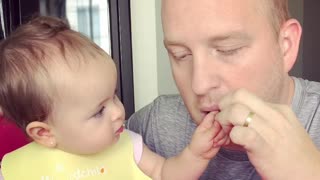 0:23
0:23
laraszon
5 years ago $90.83 earnedBaby Refuses To Let Dad Eat Her Vegetables
17.1K1 -
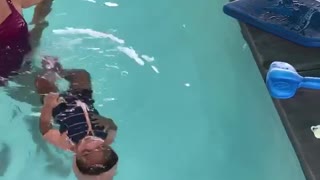 0:20
0:20
UtahSwimAcademy
4 years ago $3.43 earnedBaby Floats In Water At Only 4 Months Old
6.99K1 -
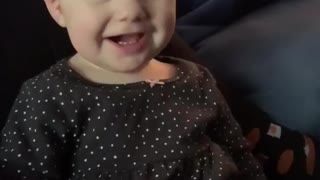 0:08
0:08
ViralHog
4 years ago $0.24 earnedBaby Wakes from Nap and Says, "That was Awkward"
849 -
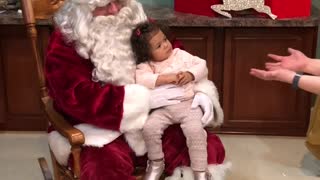 0:08
0:08
TaylerKauffman
4 years ago $20.92 earnedLittle girl refuses to leave Santa's lap
2.7K -
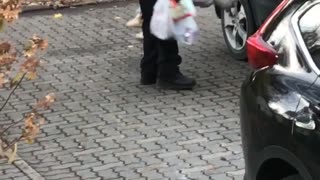 0:22
0:22
ViralHog
5 years ago $132.01 earnedTwo-Year-Old Girl Refuses to Walk
197K -
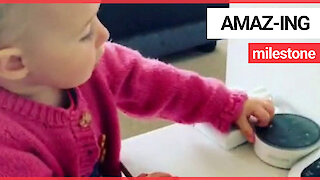 0:39
0:39
SWNS
5 years agoBaby who is obsessed with Amazon Echo says her very first word - Alexa
251 -
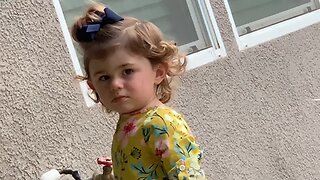 3:12
3:12
AFV
4 years agoBaby Dictators
3241 -
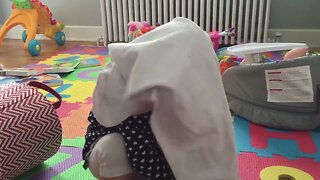 0:36
0:36
AFV
4 years agoPeekaboo Baby
433 -
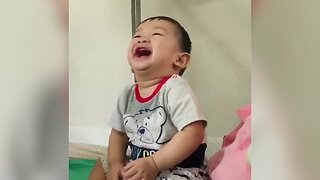 3:06
3:06
AFV
4 years agoBest Baby Laughs
3.6K3 -
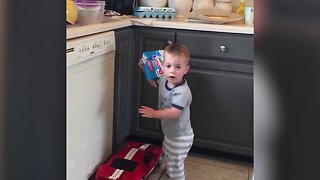 3:02
3:02
AFV
4 years agoBaby Thieves
216